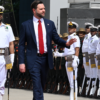Here are a few notable events and themes that caught my eye during my first week at the U.N. Arms Trade Treaty (ATT) conference:
- The totalitarian states are deviously brilliant. Their representatives have been around for years, so they know everyone, and they know the drill. They waste time expertly and are not at all shy about raising points of order and asking the same question over and over again. Their favorite tactic is to imply that everyone else is acting in bad faith, which works only if others have what they lack: a conscience. They are completely unabashed about making declarations of principle (such as Cuba’s demand for “objective criteria” in the treaty, which really means criteria that will never be used against Cuba) that are even more self-interested than most diplomacy. They don’t much like the glare of publicity, but it doesn’t really put them off. They either coordinate with each other or sing from the same song sheet instinctively. And they are shameless about playing to the many small states in the room.
- The small, poor states really do suffer for their size. During one break, I heard a collection of African delegates discussing their astonishment that the U.S. had spoken on behalf of the Permanent Members of the Security Council. The U.S. did the same thing a year ago, but evidently the delegates hadn’t noticed. Even more astonishing was Australia’s statement on Tuesday, when it proudly announced that it had paid for 50 delegates from 35 of the less developed nations to attend the conference. Australia is one of the ATT’s biggest backers, and it’s hard to imagine that these delegations, who are enjoying a very pleasant month-long trip to New York at Australia’s expense, will be anything other than completely compliant with its wishes. It’s not unknown for left-wing nongovernmental organizations (NGOs) to staff the delegations of smaller nations or even take their place entirely, and while I saw no sign of that at this conference, the flood of propaganda that the pro-treaty NGOs put out is remarkable. If you are an impoverished nation that lacks the time, money, and expertise to pay even marginal attention to the ATT, you might well be very grateful for Cuban patronage, Australian funding, and NGO leaflets. So what if it’s all biased? You wouldn’t do any better on your own—in fact, you wouldn’t even be there.
- Americans really are different. It’s unfair to take the totalitarian states as representative of the rest, but the American speaking style is remarkably direct. Virtually every other delegate begins with an elaborate acknowledgement of the conference president and a not very funny joke about something (the recently concluded European soccer championship was a popular subject). Americans, by contrast, get on with the verbal job at hand. Of course U.S. statements reflect U.S. interests (or at least the U.S. delegation’s conception of them, which is not one I frequently find myself able to share), but they don’t employ nearly as many elaborate code words. Americans appear to be trying to say what they mean, whereas a lot of other national delegations appear to be engaged in an attempt to suffocate meaning under a thick wool blanket of words. Perhaps this national trait is one reason for the oft-remarked American frustration with diplomacy.
- There are many contentious issues left to be resolved at the conference. Should the treaty—please, no—include ammunition, technology, and parts and components? Should it require so-called capacity building assistance (i.e., lots of easily wasted foreign aid that would dangerously give the U.N. a permanent funding source) from the richer signatories? Should the treaty make it crystal clear—please, yes—that it really does not apply to anything that goes on inside the U.S.?
- The real division at the conference is fourfold. There are (1) nations (mostly in Europe) that do not for a moment intend to stop selling arms or are trying to beat the Americans out of contracts but also want an ATT at least in part because they naively hope to curb a few state-led human rights abuses; (2) nations (mostly totalitarian or autocratic) that don’t want an ATT at all unless it disarms their opponents, enshrines their right to buy, and does not limit their access to technology; (3) nations (mostly African) that want capacity-building assistance and whose motto might as well be “show me the money”; and (4) Russia and China, which don’t really want an ATT but don’t really want to stop it openly either. The U.S. doesn’t fall into any of these camps, which is why it spoke for the Permanent Members.
My own view is that the conference is likely to produce a treaty. But it’s quite clear that all the treaties in the world cannot come close to making up for the insincerity, the incapacity, and a few actually honest differences of opinion on display daily at the United Nations.
The Daily Signal depends on the support of readers like you. Donate now






























